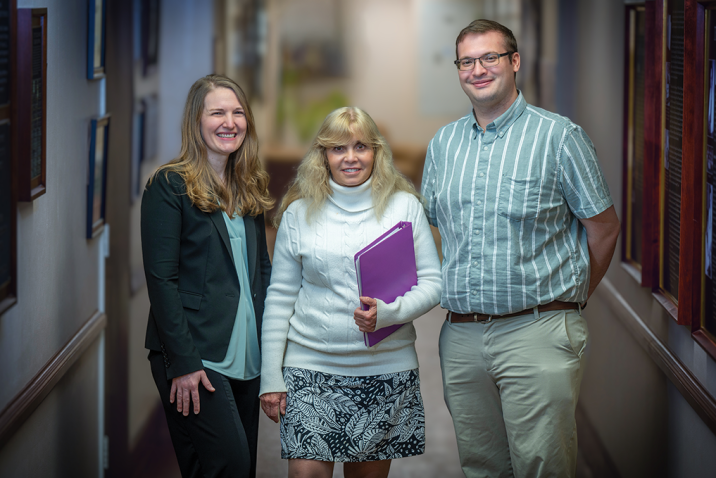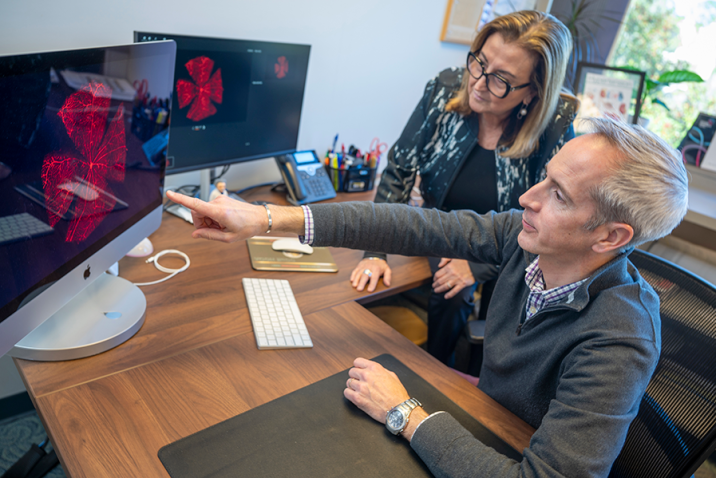AU research team awarded $4.4 million American Heart Association grant
“This grant is particularly impactful as we look to advance and improve the health of women, not just in Georgia, but for the entire country," says Jennifer C. Sullivan, PhD.
As a biostatistician, you’ll use applied statistical methods to support experiments and studies that assist researchers in various environments, including public health, government, agriculture, and the pharmaceutical industry.
By choosing to earn your Master’s in Biostatistics from the School of Public Health at Augusta University, you’ll focus on statistics as they apply to medicine, dentistry, nursing, and other biological disciplines. That focus distinguishes this program from most graduate statistics programs and prepares graduates for careers in important and rewarding medical and health sciences fields.
Biostatistics is for you if you consider yourself
Learning
like no
other.
Want to learn more about the Biostatistics program at Augusta University?
Request InfoWhat You'll Study
Students in Augusta University’s Master of Science with a major in Biostatistics program will be exposed to a wide range of methodologies and techniques to give them expertise in designing data collection methods for experiments and studies, including observational studies and clinical trials.
The two-year program is made up of 24 hours of core coursework and nine hours of electives as well as a capstone project or thesis applicable to the health sciences.
Curriculum | Admissions Criteria | Tuition and Fees | Application Deadlines



EXPLORE. EXCEL. EXPAND.
Augusta University's graduate programs are among the best in the nation – and the world – and our graduate students are our most valuable assets. To ensure that our students earn more than a degree, the Graduate School offers a range of opportunities so they can develop the leadership, communication and personal skills needed for a rewarding life and academic, research or professional career.
See what the Graduate School has to offer »
About the Graduate SchoolExperience-based Education
The Master of Science in Biostatistics program at Augusta University's School of Public
Health offers comprehensive study design, data analysis, and statistical reporting
training. Situated within a dynamic academic environment, our students engage in rigorous
research and educational pursuits to advance statistical science for global public
health improvement.
Our program offers students unique opportunities to immerse themselves in cutting-edge
research initiatives, driving innovation and patient care and well-being progress.
Our carefully curated curriculum empowers students to excel in research and actively
engage in community outreach endeavors. This holistic approach equips them with the
expertise to address pressing health challenges and advocate for equitable healthcare
solutions.
The Biostatistics program produces graduates with a strong background in biomedical and health sciences methodologies and techniques who are prepared to excel as biostatisticians in a variety of environments.
The School of Public Health is dedicated to training professionals who are passionate about overcoming societal barriers to achieve optimal health and wellness for all.
Biostatistics faculty are recognized educators who are committed to providing innovative opportunities for student learning and professional growth.
Biostatistics students wishing to continue their education can enter the Biostatistics doctorate program, which includes formal coursework and original research leading to a dissertation.
Your Future
According to the U.S. Bureau of Labor Statistics, median pay for mathematicians and statisticians, which includes biostatisticians, is $104,860 per year.
The growth rate is projected to rise much faster than average over the next decade.
Graduates of the program have gone on to work at the Environmental Protection Agency, insurance companies, academic institutions and pharmaceutical and biotechnology companies.
GPA: Overall GPA of 3.0 on a 4.0 scale at the Baccalaureate level calculated on all undergraduate work.
Degree Requirement: Minimum of a Bachelor’s degree or equivalent from an accredited college or university.
Transcripts: Official transcripts are required from all universities and colleges ever attended. Unofficial transcripts from US colleges and universities can be used in the admissions review process in lieu of official transcripts for this program.
Standardized Test Requirements: Submission of an official GRE exam score is optional.
Letters of Recommendation: Recommendations from three individuals must be submitted through the application portal.
Prerequisite Coursework: Undergraduate coursework must include three semesters of college-level calculus with a minimum grade of B in each course. Applicants must also have completed one semester of linear algebra with a minimum grade of B.
International Students: Please review the verification process for international transcripts and the english proficiency requirement.
$4,801*
Estimated total
Full-time / In-State / Per Semester
$401
Tuition Per Hour
$675
Mandatory Fees
View Detailed Program Tuition
*Tuition & Fees listed here are for in-state students enrolling in the university for Fall 2024 semester.
Detailed Program Tuition InformationEarly submission of all application materials is strongly advised.
All required application materials and documents must be received in order for an application to be considered complete and before an admission decision can be made. The program does not accept applications after the published application deadline, however the program will continue to accept application materials up to four weeks after the application deadline.

An established program with celebrated faculty means you’re prepared for the challenges of whatever work environment you choose.
As one of Georgia’s four research universities, Augusta University provides unparalleled access to groundbreaking researchers and the projects they’re involved with.
With an emphasis on statistical methods that support biomedical and health sciences research, you’ll be part of a unique program tailored for a career in rewarding health care fields.

“This grant is particularly impactful as we look to advance and improve the health of women, not just in Georgia, but for the entire country," says Jennifer C. Sullivan, PhD.

"From the start, I knew that’s where I wanted to be, and I knew I would get a great medical education there," says Stephanie Cumbey.

“I had a personal interest because my mother-in-law had a spinal cord injury, and she had really bad neuropathic pain,” says Laura Carbone, MD.

"We'll basically define a chronic HIV infection as a risk factor for the development of the most severe ocular disease," says Manuela Bartoli, PhD.